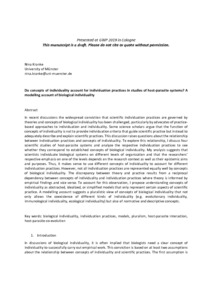Kranke, Nina
(2021)
Do concepts of individuality account for individuation practices in studies of host-parasite systems? A modelling account of biological individuality.
[Preprint]
![[img]](https://philsci-archive.pitt.edu/18610/1.hassmallThumbnailVersion/Kranke_Do%20concepts%20of%20individuality%20account%20for%20individuation%20practices%20in%20studies%20of%20host-parasite%20systems.pdf)  Preview |
|
Text
Kranke_Do concepts of individuality account for individuation practices in studies of host-parasite systems.pdf
Download (282kB)
| Preview
|
Abstract
In recent discussions the widespread conviction that scientific individuation practices are governed by theories and concepts of biological individuality has been challenged, particularly by advocates of practice-based approaches to individuation and individuality. Some science scholars argue that the function of concepts of individuality is not to provide individuation criteria that guide scientific practice but instead to adequately describe and explain scientific practices. This discussion raises questions about the relationship between individuation practices and concepts of individuality. To explore this relationship, I discuss four scientific studies of host-parasite systems and analyze the respective individuation practices to see whether they correspond to established concepts of biological individuality. My analysis suggests that scientists individuate biological systems on different levels of organization and that the researchers’ respective emphasis on one of the levels depends on the research context as well as their epistemic aims and purposes. Thus, it makes sense to use different concepts of individuality to account for different individuation practices. However, not all individuation practices are represented equally well by concepts of biological individuality. The discrepancy between theory and practice results from a reciprocal dependence between concepts of individuality and individuation practices where theory is informed by empirical findings and vice versa. To account for this observation, I propose understanding concepts of individuality as abstracted, idealized, or simplified models that only represent certain aspects of scientific practice. A modelling account suggests a pluralistic view of concepts of biological individuality that not only allows the coexistence of different kinds of individuality (e.g. evolutionary individuality, immunological individuality, ecological individuality) but also of normative and descriptive concepts.
Available Versions of this Item
-
Do concepts of individuality account for individuation practices in studies of host-parasite systems? A modelling account of biological individuality. (deposited 20 Jan 2021 14:29)
[Currently Displayed]
Monthly Views for the past 3 years
Monthly Downloads for the past 3 years
Plum Analytics
Actions (login required)
 |
View Item |




